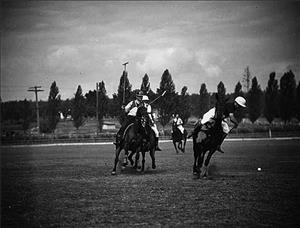On August 6, 1935, humorist Will Rogers (1879-1935) plays his last polo game at the Olympic Riding and Driving Club near Lake City. The next day, Rogers and aviator Wiley Post (1898-1935) will take off from Renton in Post's Lockheed Orion enroute to Siberia. On August 17, both will be killed when the plane crashes near Point Barrow, Alaska.
William Penn Adair "Will" Rogers was a Vaudeville roping performer who turned his stage commentary into a weekly, then daily, newspaper column, a film career, and a series of books. Dubbed the cowboy philosopher, he supplied good-natured, and sharp, but balanced criticism of contemporary affairs and public figures.
Oklahoma-based Wiley Post was an aviation pioneer who was the first to circumnavigate the globe in an airplane by himself (his historic flight, in July 1933, took seven days). In 1935, he planned to explore an air route to Asia and Europe from the United States through Alaska and Siberia. Post invited Rogers, an aviation enthusiast, to accompany him on the adventure.
Post had floats added to his modified Lockheed Orion at Northwest Air Service in Renton, since there were few landing strips in Alaska and Siberia.
Rogers arrived in Seattle on August 5, 1935, at Boeing Field from his home in California. He was met by Washington Lieutenant Governor Vic Meyers (1898-1991). Meyers told Rogers, "You once called me a trick lieutenant-governor." Rogers replied, "Yes, and I also said some nice things about you." Rogers asked to see Boeing's new XB-17 bomber, recently flown for the first time. "Gosh, that's sure a buster," he said.
Off to Alaska
Post's and Rogers's departure was delayed a day by weather in Alaska. On the afternoon of August 6, 1935, Rogers played polo at the Olympic Riding and Driving Club near Lake City. In the 1930s, the undeveloped area north of Seattle was home to six riding academies and more than 600 horses. Rogers wore a "garish red shirt and a pair of bibless overalls," apparently borrowed from a club member. Rogers was an experienced horseman and an avid polo player. In the shower afterwards, he told Seattle Post-Intelligencer columnist Royal Brougham, "Polo [is] a great game, because even old guys like me can play it." That night Rogers was a guest at a polo club dinner at the Washington Athletic Club.
On August 7, 1935, Post and Rogers left Renton and spent the next 10 days crisscrossing Alaska. On August 15, Post landed on a river near Point Barrow to ask some Native Alaskans for directions. On takeoff, the plane apparently lost power and crashed, killing both men.
A Monument
In 1938, the Olympic Riding and Driving Club erected a monument to Rogers on the site of his last polo game. They named the grounds Will Rogers Field. The property, which was later developed into housing, reached from 15th to 20th avenues and from 135th to 137th streets. The inscription read:
In Memory of Will RogersOn this field Will Rogers took his last ride. Shrines erected by the world will commemorate his passing but none could be more hallowed than this little patch of ground where the kindly, chuckling, hard-riding cow-boy played his last game of polo before he went roaring to his last round-up. We still hear his cheery halloo as with broad grin on weather-lined face he urged his pony into the thick of play. To the spirit of a mighty adventure hail and farewell.
The monument sat between 15th Place and 16th Avenue NE on 137th Street. In 1966, the monument was moved by the Lake City Lions Club, with money raised by Royal Brougham, to the Lake City Community Center. In 2001, it sat at the northeast corner of the parking lot of the Lake City Library, 12501 28th Avenue NE, Seattle.

